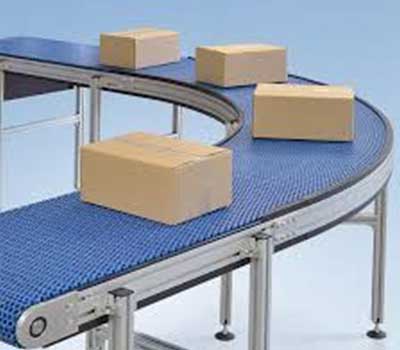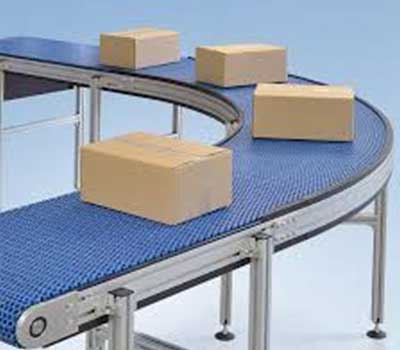The basic components of a conveyor system include:
- Conveyor Belt: This is the main component that carries the materials. It consists of a continuous loop of durable material, usually made of rubber, fabric, metal, or plastic, which is stretched between two or more pulleys.
- Pulleys: These are rotating wheels that support and guide the conveyor belt. The powered pulley, known as the drive pulley, is connected to a motor that drives the belt, while the other pulley is called the idler pulley.
- Motor: The motor provides the power necessary to move the conveyor belt. It can be an electric motor or another type of power source, depending on the application and requirements.
- Support Structure: The conveyor system is usually mounted on a framework that keeps it stable and properly aligned.
There are different types of conveyors designed to suit various applications:
- Roller Conveyors: These Conveyors use rollers to move items along a fixed path. They are often used for the handling of cartons, boxes, and pallets.
- Belt Conveyors: The conveyor belt is used to transport various materials over long distances. They are commonly used in airports, warehouses, and manufacturing plants.
- Screw Conveyors: This type of conveyor uses a rotating helical screw blade to move materials, such as grains, powders, or bulk solids.
- Chain Conveyors: They use chains to transport heavy or large items, such as automotive assemblies in automobile manufacturing plants.
- Bucket Elevators: These are vertical conveyors equipped with buckets that carry materials vertically between different levels.
- Overhead Conveyors: These systems are suspended from the ceiling and are used to transport items across large spaces, often seen in paint shops, garment industries, and distribution centers.
Conveyors offer several advantages, including increased efficiency, reduced manual handling, and a continuous flow of materials, leading to improved productivity in various industries. Our offered range of conveyors are available in various lengths, sizes and widths to meet diversified requirements of the clients. When selecting a Conveyor Manufacturer, it's essential to consider factors such as the specific requirements of your application, the industry you operate in, the type of conveyor needed, the company's reputation, and the level of customer support they offer. Always conduct thorough research and consider reaching out to multiple manufacturers to find the best fit for your needs.







